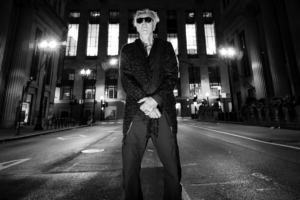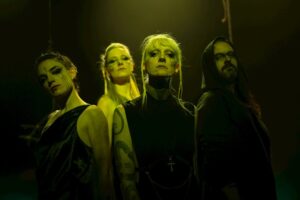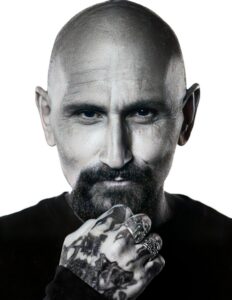RONAN CHRIS MURPHY – Music Production In Action!
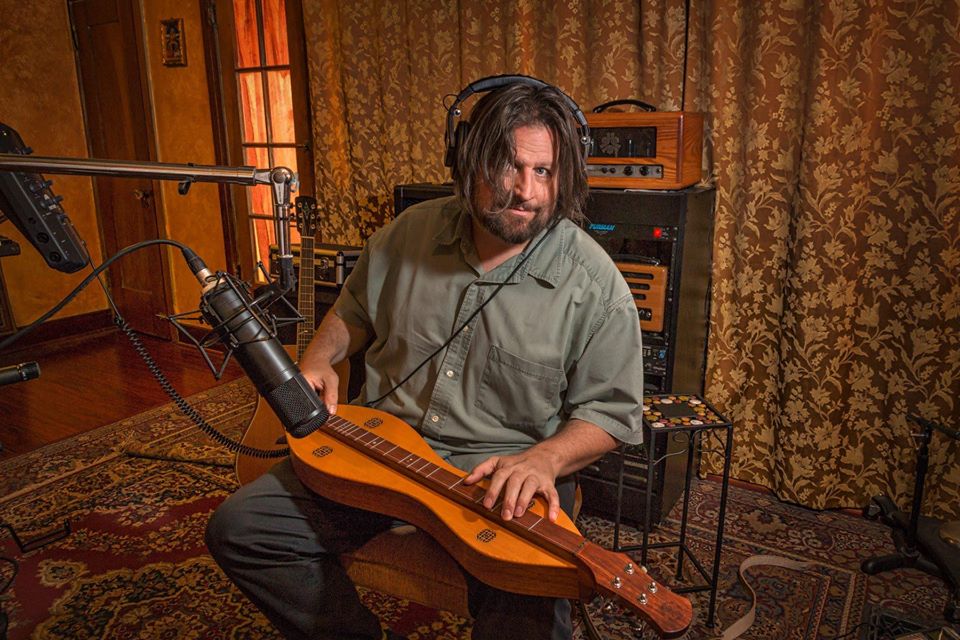
1.From playing in the 1980s Washington DC hardcore scene to working with Prog rock artists such as King Crimson. How did you manage to deal with this diversity in music styles?
Music for me has always been an adventure. I am always looking for music that moves me emotionally and expands my musical horizons. So, hearing King Crimson for the first time was not much different than hearing the Bad Brains for the first time, or hearing Baka Pygmy music from Gabon for the first time, or hearing Roni Size for the first time. They all changed with way I understood music and left me filled with emotion. I have loved music as long as I can remember, but I think of Neil Young as being the artist that really inspired me to be more serious about it. I found myself making music in the early American hardcore scene (I was lucky to be in one of the best places in the country for that) and later in the scene that became known as grunge or alternative. My funny footnote in rock history is that my first band and Dave Grohl’s first band was a punk band called Freak Baby, but we were in it at different times. My bands were playing with bands like The Flaming Lips, Iron Cross, Dinosaur Jr, Death Angel, the Adolescents, ALL and Henry Rollins. When I started working professionally in recording, most of my clients were doing Hip Hop or Jazz Fusion and I was experimenting with electronic music on the side. Then I was invited to work at the Banff Centre for the Arts in Canada, where most of my work was in Chamber Music, Jazz and experimental electronic music. So when I started working with King Crimson, it seemed like my whole music life thus far had prepared me for it.
I have a lot of respect for virtuosity and complexity in music, and, indeed, some of my favorite music has those elements, but for me, great music is about creating great art and conveying emotion. I certainly do not put a super refined prog rock band on a higher pedestal than an indie rock band that is trying to create something new in a powerful way, or a pop artist who is crafting the perfect summer party song. Because I have been blessed to work with some of the greatest prog musicians in the world, I do end up doing a fair amount of work with artists in that vein. But when I am producing that kind of music, I am always pushing to make sure that the focus is on art and emotion, and trying to make sure that the mantle of being “progressive rock” does not prevent them from being progressive.
2. How do you deal with the different needs of the artists when you work on a new project? What are your requirements before you start collaborating with an artist?
I work with such a wide range of artists, and my role is often changing. I can be either producing, engineering, mastering, performing, writing or all of the above. I love how diverse my work is. My goal is to always figure out what the project needs, and to bring that to it. With some artists I go in and help them develop who they are as artists, and other times I just make sure that everything sounds great and that everyone is having a good time. For some artists I will dive in and re-write their songs with them and play some of the instruments, etc. But if I am working with a guy like Steve Morse, who has such an insane amount of talent (even as an engineer) and a clear idea of who he is as an artist, I am just there to help push the cart so to speak.
Every once in a while I will turn down working with artists I admire because I know I am not the right producer for them. I am good at what I do, but I know my strengths and weaknesses. Sometimes I see where a band wants to go with a new album and I know that I am not the best person to help them get there.
I am also really lucky that for most of my career I have been able to choose who I work with. Except for the first couple years, I was never part of a business with a sign out front, where anyone that wanted to record could book time, and work with me. I am fairly open about who I will mix and master for, but if I am producing a project, it is essential that I respect the artist and what they are trying to do. They do not have to be technically great, but I have to respect their vision or their approach to the music. On one hand, it is kind of soul sucking to work on music you do not respect, but even more important is the fact that I might not respect someone’s work because I do not understand it. Any artist would be better served by a young inexperienced producer that felt honored to be a part of the music, than they would be by a veteran producer that looked down on them or did not respect what they were trying to do.
3. Any strange or unusual situations that you have faced as a music producer?
Yeah, quite a few that client confidentiality prevent me from talking about, but when you asked the question, I thought of something funny.
When I was in residence at the Banff Centre for the Arts, which was a magnet for creative artists from around the globe, I was brought into all sorts of music projects with amazing musicians. I had a chance to work with immensely creative folks like Kenny Wheeler, Kaija Saariaho, Chucho Valdes, Muhal Richard Abrams, Norma Winstone, John Giorno, Robert Kyr…. I never knew what opportunities would pop up. One day I was asked if I would be interested in recording a new project by an avant-garde composer from Quebec that had written a piece for 12 operatic sopranos playing paper bags!! It sounded crazy enough that I knew I would probably love it. When I got involved, I realized that the piece had been specifically written for operatic sopranos, but they did not sing at all. They just made scratching sounds with the bags and blew on them!! I love surrealism, so I was completely on board. Sadly, I do not know what ever became of those sessions, and I do not have a copy.
4. In terms of engineering, what is your opinion about the battle of Digital Vs Analog studio tools?
I absolutely do not take clear sides on the issue. I started working with digital audio around 1991, and MIDI before that. I did my first “in the box” mix in 1993. I have some projects I do that are almost 100% analog and others that are almost 100% digital. I just figure out the best tools for the job. Some things work better in the analog domain and other things work better in the digital domain. There are trade-offs with both options. The quality gap between analog and digital tools is definitely closing, but there are a few things, like guitar amp emulations, where I think the analog tools are still far superior. Digital has opened up a lot of possibilities, but I think the ease of operation for so many things in the digital world has changed the way people interact with making music, and one of the things we have lost is a certain intensity and focus when creating music. This is a little sad to say, but in general, I see musicians not engaging with recording with the same intensity and sense of purpose as in the past, because they know how easy it is to “fix” things. There is a certain power that comes from being fully committed to a performance and knowing that you need to be your absolute best at that exact moment in time. I am seeing less of that intensity these days. It is far less often that I get moved to tears by a performance in the studio than I used to.
When it comes to listening to music, I just love just listening to music. Listening to vinyl on a great hi-fi system is a thing of beauty. But in its own way, so is listening to a great pop song MP3 with earbuds when I walk to the store. I used to have an old mono portable cassette recorder that I would listen to while I walked my dog as a child. Listening to Van Halen I on that thing, while walking my dog, is one of my favorite music memories. I feel sorry for people that cannot enjoy listening to music on lesser systems.
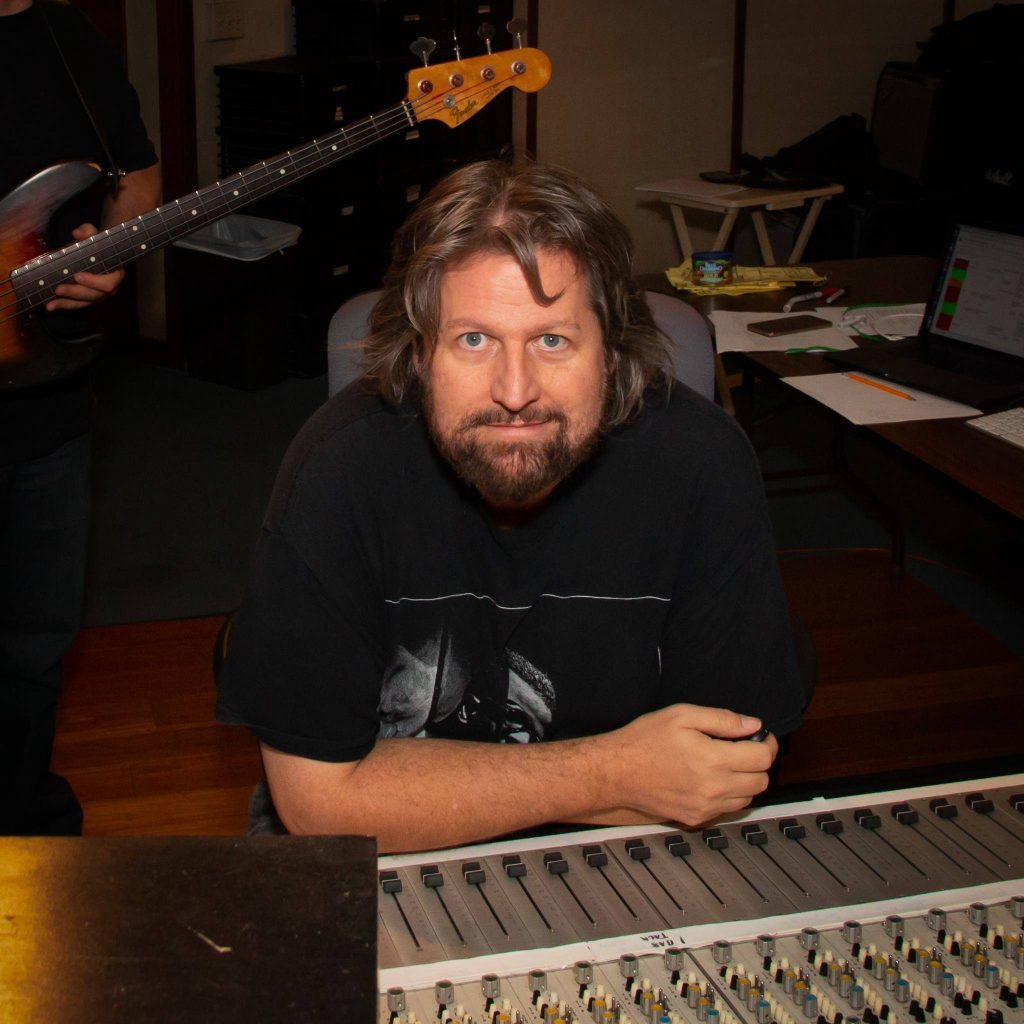
5. You have 2 new tracks out as a solo artist. Would you like to talk to us about your new work? Is there any unreleased material that you plan to put out as a full album?
When I started producing and engineering, I was convinced that I would simultaneously be a performing artist and a producer. But the recording end of things took over my life. I am fine with that, because I love producing and engineering, and honestly think I have more of a contribution to make in the world on that end of things. But I have always worked on my own music in my down time with the idea of releasing some of it. Several years ago, I started being more pro-active about getting a solo album done, so I started developing the ideas more seriously and I got some of my friends to help me out. The building blocks for a ton of music got started, and, all of a sudden, the album project had turned into a massive sprawling beast. It would be enough for at least a triple album if I put it on vinyl.
I am not complaining, but I have been quite busy as a producer and engineer for a lot of years, and often, being in the studio making my own music is not what you want to do to relax after a long day of being in the studio working on other people’s music. Also, being a producer and being an artist are very different head spaces. Being an artist requires getting metaphorically drunk with the Muse, and being a producer requires acting as the designated driver. It is hard for me to instantly flip a switch between one role and the other.
This giant beast of an album was getting too daunting to dig into. Finally, I had the idea of breaking the giant beast up into more manageable units. I put out these first two singles to get the ball rolling. There are a couple good things about breaking the album up into smaller projects: One is that I can actually complete things. I help other artists complete giant projects all the time, but it is harder with my own work. But I can get these smaller projects done. The second is that it will make for more focused works. There is a lot of diversity in my own work and with the smaller albums, they are going to be much more focused works, rather than a catalog of things I have done. I still value the concept of an album as a singular work of art.
So, these first two singles represent a spark to me, and have that musical sense. They are short flashes of energy. If all goes to plan, the first full album will be fairly dark and brooding, largely built around some of the pieces I wrote with Terry Bozzio, as well as some electronic work, and a few things with Levin, Mastelotto and Keneally that fit that vibe. The album after that will be more of a rock album largely built around my work with Levin, Mastelotto and Keneally.
6. The new musical work of yours include a collaboration with Pat Mastelotto, Terry Bozzio, Victor Bisetti, and Mike Keneally. Which was their role in this release?
These two singles, as well as a lot of the work that will be coming out, is based on my work with Pat Mastelotto, Terry Bozzio, Tony Levin and Mike Keneally. When I got in the studio with those guys, I brought in some music I had previously written, but I also left ample time for improvisation to create building blocks to further develop into pieces later. The two new singles came from that latter approach. I started doing this kind of work with King Crimson on the “ProjeKcts” albums. We (mostly with the late Ken Latchney doing the engineering) would record the band doing live improvisations and then take the tapes back to England where I would pick out cool parts with Fripp and David Singleton to be assembled into new songs. I further developed this approach when I produced an album called “Spiral Out” for guitarist Willie Oteri. With that album Willie and I put some basic themes together and then got Pat Mastelotto and Tony Levin to improvise with Willie on those themes. I then took those jams, edited them into song forms and then Willie, Mike Keneally and I added new parts on top of that. This is the approach that created both of the new singles and quite a bit of the material on the upcoming albums.
Victor Bisetti has been a long-time secret weapon for me as a producer. I will often bring him in at the end of projects to play percussion. It is amazing how he can create simple parts that make my productions more cohesive and filled with life. That is how I am using him on my own music.
7. The two tracks are instrumental and there are no lyrics. Which is the meaning behind each song title?
They are both phrases I encountered while working on the music that seemed to resonate with the songs I was working on. When John Lennon wrote the song, “Being For The Benefit Of Mr. Kite”, most of the lyrics came from a 19th-century circus poster for Pablo Fanque’s Circus Royal. In the song, Lennon sings “And of course Henry The Horse dances the waltz”, but on the original poster, the horse is introduced as the “Celebrated Horse, Zanthus!”. I have the poster in my home and see it every day. When I was working on “Another Mother for Peace”, I was creating a piece that alternated between angst and chaos that resolved into peace. I saw a bumper sticker on the back of a car that said, “Another Mother for Peace” and it seemed to fit perfectly.
8. From time to time you work with the Greek Pop musician Alexia, how did this happen and is there any new plan to record new music together?
Alexia and I met in the South of France many years ago and we instantly bonded. It was like we became old friends in a day. We talked about doing some music together. One day she was visiting my studio in California and she lamented that we had not had a chance to make music together, so I said “OK, let’s do it! Right now!” So I started playing guitar and she sang and something really magical happened. I am not sure how the rest of the world experiences the music that we make, but it is something really special for both of us. We have recorded a bit together and played a concert together in Paris a few years ago, but we both have busy lives and do not work together as much as we would like. I am actually writing some new pieces now that I hope to record with her this year, and we always dream about doing more performances. The music we do together is somewhat ambient and other-worldly, so we are always dreaming of ways that we can create performance experiences that are something more than just a concert. where it is more of an immersive experience. Hopefully, when things are a bit safer with the pandemic, we can be a bit more pro-active about that.
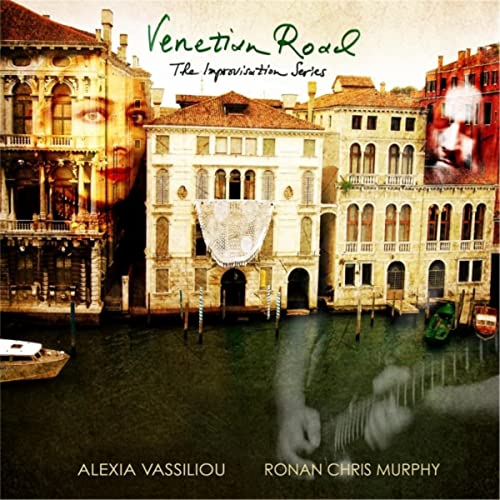
9. What would be the advice to give the musician Ronan Chris Murphy if you manage his project from the music producer’s perspective?
Wow! This is one of the most interesting interview questions I have ever been asked.
I like to think that artist Ronan has finally started to listen to producer Ronan. Producer Ronan told artist Ronan to finish ideas and to get some darn music out into the world. My day job as a producer is to get things done. People hire me to make sure that an artist gets their work done. As an artist and creative person, I have a huge problem of working on too many different ideas and getting distracted. I have so many unfinished pieces of music, a book, photography projects, live event concepts…… ALL UNFINISHED!
When Covid-19 started to shut everything down, I immediately had 3 or 4 months of work and travel cancelled. I decided I would use the free time to start getting my own personal projects done. For better or for worse, almost all of that empty time got filled up by other artists and labels wanting me to work on various albums and video game projects (almost all of the pandemic work has been mixing and mastering). But the idea of actually getting personal work done had been stoked and I started spending more energy to actually make it happen.
One thing that is really good about a producer spending time as an artist is that it helps me empathize more with artists I work with. Even though I have worked on hundreds of albums all around the world, when I am being an artist, I face all of the same frustrations and insecurities other artists face. I face the same doubts, wondering if anyone will like what I do, or care about it, or if I am even worthy enough to be putting music out into the world. Thankfully, producer Ronan has been kicking artist Ronan in the butt to get it out there anyway.
Information:
venetowest.com
Ronan Chris Murphy: Producer, Engineer, Artist
